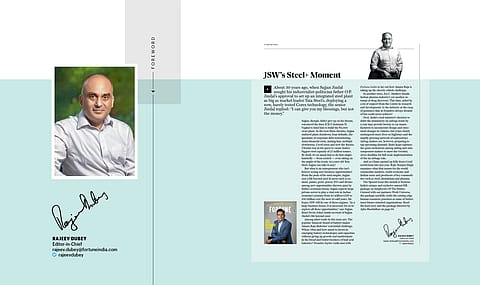JSW’s Steel+ Moment
Sajjan sees a life beyond steel in areas such as cement, paints, ports, power, EVs and drones among new opportunities thrown open by India’s economic boom.

This story belongs to the Fortune India Magazine April 2023 issue.
About 30 years ago, when Sajjan Jindal sought his industrialist-politician father O.P. Jindal’s approval to set up an integrated steel plant as big as market leader Tata Steel’s, deploying a new, barely tested Corex technology, the senior Jindal replied: “I can give you my blessings, but not the money.”
Sajjan, though, didn’t give up on his dream; convinced the then ICICI chairman N. Vaghul to lend him to build the ₹4,000-crore plant. In the next three decades, Sajjan endured plant shutdown, loan defaults, the ignominy of corporate debt restructuring, Asian financial crisis, mining ban, multiple slowdowns, Covid crisis and now the Russia-Ukraine war in his quest to create India’s biggest steel capacity of 27 million tonnes. By itself, it’s no mean feat to do that single-handedly — from scratch — even taking on the might of the iconic 115 years old Tata Steel. Sajjan can take it easy!
But what is an entrepreneur who isn’t forever eyeing new business opportunities! From the peak of his steel empire, Sajjan sees a life beyond steel in areas such as cement, paints, ports, power, EVs and drones among new opportunities thrown open by India’s economic boom. Sajjan expects large private sector to play a vital role in Indian economy’s journey from $3 trillion GDP to $10 trillion over the next 10-odd years. He hopes JSW will be one of those engines. “As a large business house, it is necessary for us to explore all these opportunities,” says Sajjan. Read Nevin John’s inside account of Sajjan Jindal’s life beyond steel.
Among other reads in this issue are: The popular ‘Amaron’ brand of battery maker Amara Raja Batteries’ existential challenge. When, what and how much to invest in emerging battery technologies and capacities without giving up growth and marketshare in the bread and butter business of lead acid batteries? Founder Jaydev Galla met with Fortune India to lay out how Amara Raja is taking up the electric vehicle challenge.
In another story, Joe C. Mathew details Indian pharma industry’s yet another attempt at drug discovery. This time, aided by a lot of support from the Centre in research and development. Is the industry at the cusp of greatness that its founders always dreamt of but could never achieve?
More Stories from this Issue
Next, India’s road ministry’s decision to defer the mandatory six airbags norm by a year may provide leeway to car manufacturers to incorporate design and structural changes in vehicles, but it has clearly endangered more lives on highways and the rapidly growing network of expressways. Airbag makers are, however, preparing to tap upcoming demand. Rishi Kant captures the great excitement among airbag and auto component makers to meet the October 2023 deadline for full-scale implementation of the six airbags rule.
And as China opened up fully from Covid restrictions late last year, Rajiv Ranjan Singh examines what that means for the world commodity markets, world economy and Indian users and producers of key commodities such as steel, aluminium and pharma.
(INR CR)
The Special Issue this month is Fortune India’s unique and exclusive annual HR package on Employers Of The Future. Curated with our partners Work Universe, the package carefully crafts the cutting-edge human resources practices at some of India’s most future-oriented organisations. Read the lead story and the package directed by Ajita Shashidhar.